Reprinted from Rixstep.
So Julian Assange finally got to submit his statement to the elusive Marianne Ny. Things rolled pretty fast there for a while - it took only 74 months. But now it's been done.
Notwithstanding the clear UK meaning of ‘judicial authority’ to mean a magistrate, judge or court; notwithstanding that Parliamentary debates and reading speeches reiterated that definition; notwithstanding the primacy of the UK parliament to enact law for effect in the UK; notwithstanding the Framework Agreement using the same word(s) in an official English version of it as the Extradition Act: the Supreme Court (decided cases) has stated by majority that parliamentarians were conned because an obscure Convention gives a contrary, minority meaning.
Transcript of the UK Supreme Court handing down the judgment in Julian Assange v Swedish Prosecution Authority, 09:15 on 30 May 2012. The full judgment and further statement is available at the UK Supreme Court's website.
I am indebted to Glenn Greenwald who posted an article here on the Tarek Mehanna case.
Greenwald outlines the case:
Tarek Mehanna, an American Muslim, was convicted this week in a federal court in Boston and then sentenced yesterday to 17 years in prison. He was found guilty of supporting Al Qaeda (by virtue of translating Terrorists’ documents into English and expressing “sympathetic views” to the group) as well as conspiring to “murder” U.S. soldiers in Iraq (i.e., to wage war against an invading army perpetrating an aggressive attack on a Muslim nation)
In a link by Greenwald to Julia Spitz of MetroWest Daily News, further details emerge:
He was a 'serious young man' who wanted to 'exemplify Islam,' said the judge, but became consumed by a fervor that led him to support al Qaeda by translating materials from Arabic into English and 'proselytizing' to recruit others to embrace his views.
Embrace his views or incite others to violence? (one might ask). As I wrote here, about incitement on the subject of certain Americans inciting others to kill Julian Assange:
There is no automatic 1st Amendment protection per Brandenburg v. Ohio, 395 U.S. 444 (1969):
Freedoms of speech and press do not permit a State to forbid advocacy of the use of force or of law violation except where such advocacy is directed to inciting or producing imminent lawless action and is likely to incite or produce such action
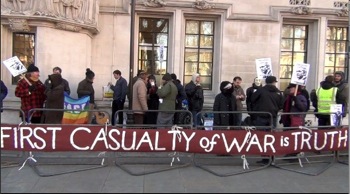 During the second and final day of the U.K. Supreme Court's hearings on Julian Assange's extradition, Matrix Chambers attorney Clare Montgomery offered her rebuttal to arguments made yesterday by Assange's counsel. (Dinah Rose is representing Assange in his fight against extradition to Sweden for questioning on sex crime allegations.)
During the second and final day of the U.K. Supreme Court's hearings on Julian Assange's extradition, Matrix Chambers attorney Clare Montgomery offered her rebuttal to arguments made yesterday by Assange's counsel. (Dinah Rose is representing Assange in his fight against extradition to Sweden for questioning on sex crime allegations.)
The week's proceedings have highlighted disparities of law among EU countries and the legal challenges involved in reconciling these conflicts. Assange's case may test the extent to which EU nations can maintain their legal autonomy under the rubric of a unified European system. It may also raise the question: to what degree will EU states have to harmonize their conflicting legal regimes in order to avoid this sort of continued legal wrangling in the future?
Montgomery presented Sweden's case against Assange for about four hours, during which time she appeared to reject EU-wide legal standardization -- essentially arguing that respecting state sovereignty requires preserving the status quo. If it agreed with Montgomery's position, the Court would have to accept significant differences among EU nations in implementing EU-wide legal standards. By contrast, Assange's legal team largely took the position that, while allowing for some variation and inconsistency, the Court should mandate certain universal principles in the extradition process, because of the seriousness of the potential risk that extradition may pose to individual rights.
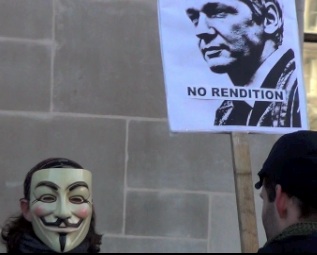 At Day 1 of the Julian Assange extradition hearing
At Day 1 of the Julian Assange extradition hearing
On the night before the hearing began, one dedicated Assange supporter in London told me that she planned to arrive at Court by 6 a.m., ahead of the throngs that she expected based on the turnout at Assange's hearing last November. No doubt the freezing February temperatures kept large crowds at home this morning; instead of the masses anticipated, there were only a few orderly lines segregated into cameramen, sign-wielding protesters, and the courtroom audience -- a mix of media representatives, Assange faithfuls, and the curious. I was in the latter line, which was also peppered with a few Occupy London luminaries. During the next hour of collective shivering, I met journalists from all over Europe and the U.S., who now braved frigid weather to witness this historic proceeding. Arriving at around 8:30, one hour before the Court opened to the public, I witnessed the expectant crowd devolve into a chorus of complaints as the early-morning, late-winter wind chill robbed our fingers of almost all feeling.
But, mercifully, 9:30 at last arrived -- as did Assange, soon after. The white-haired WikiLeaks founder offered a spirited hello to the crowd and preceded us into the Court.
At the entry, Court staff had handed out a media briefing, which included the following details:
"Issue: Whether a European Arrest Warrant ('EAW') issued by a public prosecutor is a valid Part I EAW issued by a 'judicial authority' for the purpose and within the meaning of sections 2 and 66 of the Extradition Act 2003.
15 Overlooked Facts About the Assange Extradition Case
1) Julian Assange is not charged with anything in Sweden or any other country.
[Source: @wikileaks]
2) Julian Assange did not flee Sweden to avoid questioning. He was given permission to leave the country on the 15th September 2010, after remaining 5 weeks in Sweden for the purpose of answering the allegations made against him.
[Source: Undue delay for Julian Assange's interrogation]
3) The case against Julian Assange was initially dropped, and deemed so weak it could not warrant investigation. After the intervention of a Swedish politician close to American diplomats, it was revived by a different prosecutor. [Source: Why is Julian Assange in jail?]
4) In all instances, the 2 plaintiffs consented to sexual intercourse, which they did not take the initiative to stop: they never expressed non-consent and afterwards declared to not have felt threatened by Julian Assange.
[Sources: Swedish Police Report and The offences described in the EAW are not extradition offences]
UPDATE 18th March 2012 AEST 14.48: Due to gross misrepresentations by the main stream media since Wikileaks announced on 16/17 March 2012 Julian Assange's candidacy for the next Australian Senate elections, it has to be noted that the article below was one written completely and independently of Wikileaks, was written and posted at WL Central as a result only of a general tweet from Wikileaks seeking information. The article represents the independent legal opinion/recitation of Australian law and following, the independent political opinion of the writer in relation to a candidacy of Julian Assange for the Australian Senate.
The writer and WLC simply request that the main stream media cease and desist from those gross misrepresentations (and grasp one essential fact by the way: WLC is not WL). Link to the miscreant msm:
http://wlcentral.org/node/2508
On Christmas day 2011 @Wikileaks posted a most intriguing question on twitter.

Lawyers traditionally, rarely give free legal advice off the cuff in unfamiliar areas without 'due diligence' research. One case of that was the wrong investment advice given at a social function and a lawsuit that followed - moral, that's why you should never ask a lawyer at a party for free advice, you might have to sue - however, on this occasion the question was so intriguing, a quick check of the Commonwealth's Electoral Act section 163 and section 42/43 of the constitution revealed some relatively simple law:
In the last few days, many have seen the shocking video of a police officer, one Police Lt. John Pike, pepper spraying a line of seated, peaceful non-violent students at the University of California (Davis.) ...one female protester was rushed to hospital in an ambulance for treatment of chemical burns. Ten protesters were arrested.
This use of chemical weapons on peaceful students representing no threat to the community such as a breach of the peace, or any other sign of potential violence, riot, affray or public disorder escalates the 'war' against the #OWS movement to frightening new levels.
I use the words "Chemical Cops" noting that pepper spray is banned under the Chemical Weapons Convention, and that being so, (given also that the Los Angeles Times in 1995 reported 61 deaths attributable to pepper spray since 1990) recklessness in its use may lead to a homicide being made out.
The question is immediately raised that if this substance is banned for war use, how do we allow it to be used on fellow citizens in time of peace? How do we allow its use for what is - obviously in this case - a method of extra-judicially punishing dissent?
The risk of death being ever present in its use; the culpability of its wantonly reckless use on innocent people by officer Pike is palpable.
I have the greatest respect both for Jennifer Robinson and Julian Assange, both stalwarts in the field of human rights, the former in her capacity of legal representation and advocacy, and the latter as arguably the greatest whistleblower on abuses of human rights, of all times.
Their joint recent article at the Sydney Morning Herald I found to be well argued but I am not yet wholly convinced that the law is wrong on the issue of free speech, (the Racial Discrimination Act 1975 - "RDA" - being the subject of contention here) which they both oppose in law and disagree with the particular decision in Eatock v Bolt [2011] FCA 1103, (Federal Court of Australia.)
It's not that I necessarily oppose the abolition of the RDA, simply I advance the proposition that minorities still need some kind of protection from personal vilification and personal defamation, and that the debate needs more people to become politically involved. On the other hand that cannot or should not extend to the creation of a special category of 'religious defamation' that Islamic nations have recently tried to get up at the UN.
Responding belatedly to my letter of 2011/07/21, the Attorney General Robert McClelland (and therefore the Australian government) have made it clear (yet again) that the David Hicks matter and torture allegations is something to make pious platitudes about but otherwise, they have no desire to do anything else.
Here is the letter:
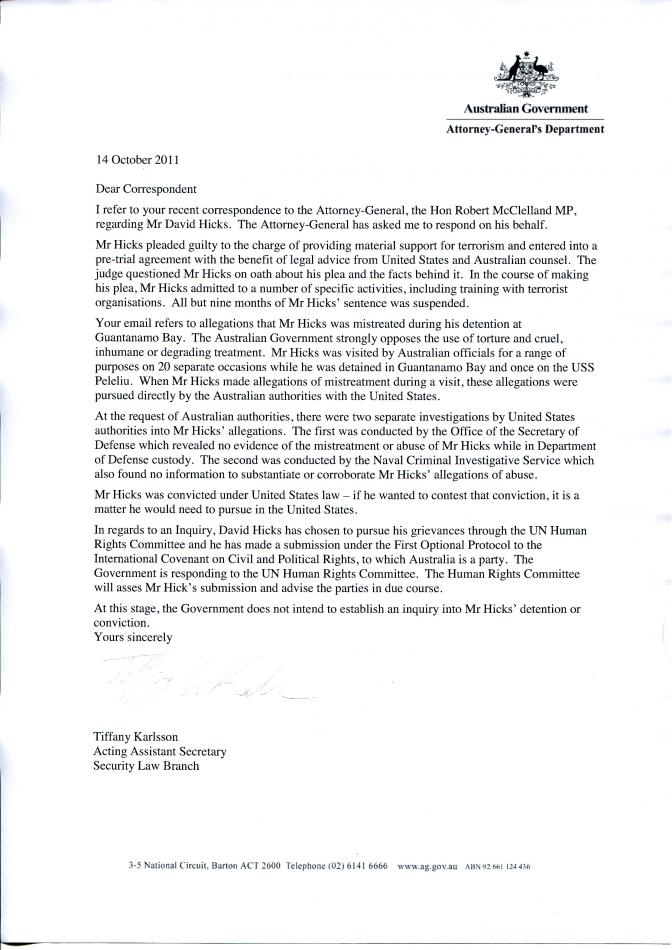
Note the following six points in summary form, made by McClelland's office:
Attorney General of Australia
The Honourable Robert McClelland
Dear Sir
It is with much dismay and revulsion that many Australians, inclusive of legal practitioners, observe the ongoing persecution of David Hicks, under the guise of mounting an action to confiscate his book royalties under the Proceeds of Crime Act 2002. After five and a half years of incarceration in the legal black hole of Guantanamo Bay, subjected to torture and numerous other breaches of his human rights including an unfair trial, application of retrospective law, abandonment by the then government of Australia (and active cooperation by it in his abuse): it is an act that reiterates, condones or inherently approves of - and raises yet again, the question of accessorial liability for - the internationally recognised, egregious and illegal acts of the US administration at that time.
The facts of the matter are that David Hicks, to end his unjust ordeal, under extreme duress and coercion, pleaded to a charge of providing material aid to a terrorist organisation: that US law being retrospectively applied contrary to the ICCPR and under a flawed Military Commission Act disowned by the current president . The Australian government aided and abetted that plea, knowing of the abuse, and with domestic legislation cooperated with the US to see to it that David Hicks served out the remainder of his sentence in an Australian jail, prohibited from speaking out under a further Control Order, which was at that time, not just, but such a politically convenient result for John Howard, prior to the 2007 election.
On July 10 and 11, WL Central's Alexa O'Brien moderated a conversation between Göran Rudling, former witness for the defense at the February extradition hearing for Julian Assange, and Peter Kemp, WL Central legal commentator and Australian solicitor.
Göran Rudling is a Swedish citizen and author of, "Sex, lies, no videotape and more lies. False accusations in the Assange case" in which he deconstructs the case against Julian Assange. Mr. Kemp has translated and made commentary on Mr. Rudling's article from its original Swedish.
Mr. Rudling has also recently written "Weird accusation or proof of lies? More about the Assange case", which covers some of the contents of our 2 hour discussion.
Total running time is about 2 hours. There is image degradation the first 30 seconds of Part 2 and 3. Sound quality is of lesser quality comparatively on Parts 2, 3, and 4 only.
The European Arrest Warrant (EAW) not for the purposes of prosecution argument.
Readers are likely aware that English speaking nation’s common law concepts/language do not necessarily have equivalents in Sweden, mens rea (guilty mind) being a major one lacking in Swedish sexual offences legislation for example (relating to lack of consent*). Julian Assange’s defence made substantial arguments at the extradition hearing that the EAW was not for the purposes of prosecution, that the use of the word “lagforing” in the warrant, meaning judicial process, was not sufficient to qualify as meaning a prosecution for the required purposes of an EAW.
As Judge Riddle wrote, in page 14 of his judgement (Full ruling here in Pdf.):
Under section 2(2) and (3) Extradition Act 2003 an arrest warrant must contain a statement that the Part 1 warrant is issued with a view to his arrest and extradition to the category 1 territory for the purpose of being prosecuted for the offence….
What is required by section 2 of the Act is an arrest warrant which contains a statement that the warrant is issued for the purpose of being prosecuted. The question has been considered in a number of earlier cases, including Trenk, Vey, Mighall, Patel and Azstaslos. The defence argue that the EAW nowhere states unequivocally and without ambiguity that Mr Assange is sought for prosecution. The EAW was translated from Swedish into English by a translator appointed by the Swedish National Police Board. It begins “This warrant has been issued by a competent authority. I request that the person mentioned below be arrested and surrendered for the purposes of conducting a criminal prosecution or executing a custodial sentence or detention order”.
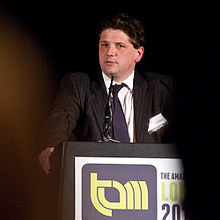 David Allen Green, legal correspondent for the New Statesman out of the UK, has spent the last few days calling attention to a leaked confidentiality or non-disclosure agreement (NDA), which he revealed in a blog post on May 11. Green has posted a second post on the agreement on his blog, Jack of Kent, and will be posting a summary to the New Statesman website on May 16, which last time I checked, he intends to glibly title, "NDAs for Dummies."
David Allen Green, legal correspondent for the New Statesman out of the UK, has spent the last few days calling attention to a leaked confidentiality or non-disclosure agreement (NDA), which he revealed in a blog post on May 11. Green has posted a second post on the agreement on his blog, Jack of Kent, and will be posting a summary to the New Statesman website on May 16, which last time I checked, he intends to glibly title, "NDAs for Dummies."
I published an initial analysis of the leaked agreement on WL Central. The analysis was featured as a “Best Opinion” in an “Irony Alert” blog post on the agreement on The Week’s website.
Green, who is the blogger who was the first to draw attention to the agreement, called it a “draconian and extraordinary legal gag that WikiLeaks imposes on its own staff” and, in particular, focused on Clause 5 of the agreement that “imposes a penalty of ‘£12,000,000 – twelve million pounds sterling’ on anyone who breaches this legal gag.”
In his follow-up post, which cites the analysis I wrote, he groups me with others who “sought to explain the document away: to normalize it and to contend that it is somehow unexceptional.” That is true. That is what I did.
He adds:
It may be well that for WikiLeaks partisans (like "the Birthers" in the United States), nothing - not even a disclosed document- will shift their adherence to their cause.
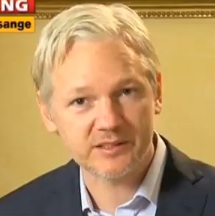 A federal grand jury is meeting at 11 am EST in Alexandria, Virginia. The grand jury is being employed to “build” a case against Julian Assange, the WikiLeaks founder who just won a gold medal for peace and justice from the Sydney Peace Foundation.
A federal grand jury is meeting at 11 am EST in Alexandria, Virginia. The grand jury is being employed to “build” a case against Julian Assange, the WikiLeaks founder who just won a gold medal for peace and justice from the Sydney Peace Foundation.
“The WikiLeaks case is part of a much broader campaign by the Obama administration to crack down on leakers,” writes Carrie Johnson of NPR. Johnson is one of a few reporters in the US press who has published a report today on this stirring development in the United States. She finds “national security experts” cannot “remember a time when the Justice Department has pursued so many criminal cases based on leaks of government secrets.”
The number of people subpoenaed to appear before the grand jury is unclear (and not in any of the few news articles published on the grand jury so far). What is known is that at least one individual from Cambridge was issued a subpoena seeking to compel him to testify before a Grand Jury. Glenn Greenwald of Salon.com reported the individual served had a public link to the WikiLeaks case and it was “highly likely” the subpoena was connected to the WikiLeaks Grand Jury investigation.
There are two other federal Grand Juries that are ongoing in the country. In San Jose, California, a Grand Jury has been empanelled to investigate the “hacktivist” group, Anonymous. Another Grand Jury in Chicago has been empanelled to target antiwar, labor and international solidarity activists for their political action.
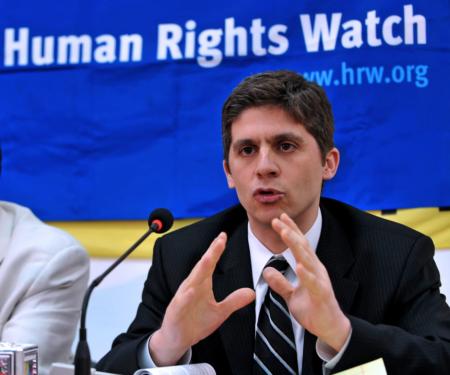 On May 4, Mr. Colangelo, a Senior attorney at US-based Dorsey and Whitney LLP, and a consultant with Human Rights Watch was bared entry into Bahrain. Authorities cited his need for a visa, because of the "kind of work" he does, although Colangelo has frequently travelled to the country on various business matters with no prior incident.
On May 4, Mr. Colangelo, a Senior attorney at US-based Dorsey and Whitney LLP, and a consultant with Human Rights Watch was bared entry into Bahrain. Authorities cited his need for a visa, because of the "kind of work" he does, although Colangelo has frequently travelled to the country on various business matters with no prior incident.
In February, Mr. Colangelo spoke at a press conference at Bahrain Human Rights Society (BHRS) in Manama. Mr. Colangelo has also represented Bahraini who were Guantanamo detainees.
HRW has released an 89-page report stating that Bahrain needs to take "urgent steps to end torture and ill-treatment of security suspects during interrogation. The report also called on the government to promptly investigate all torture allegations and prosecute security officials suspected of abusing detainees" (Source; Saudi News Today).
Bahrain's ongoing crackdown has escalated since February, targeting every level of society with fewer and fewer outside observers allowed into the country. See WL Central's ongoing coverage of Bahrain: May, April, March 1 through 21, March 22 through 31, and February.
I spoke last night EST with Mr. Colangelo, while he was on a stop over in Paris, en route back to the Unites States from Bahrain.
TRANSCRIPT
Why were you going to Bahrain?
I have been involved with issues concerning Bahrain for a number of years. It began with representing the Bahraini who were detained at Guantanamo, and more recently I have worked as a consultant with Human Rights Watch on domestic Bahrain issues.
Kevin Rudd
Minister Foreign Affairs
PO Box 6022
House of Representatives
Parliament House
Canberra ACT 2600
AUSTRALIA
Dear Minister
1) Julian Assange and Wikileaks.
Firstly I would like to say that the international community who support Julian Assange would undoubtedly thank you for your support of him on the issue of his legal rights in the UK and scotching the threats made by your colleagues the prime minister Ms Gillard and attorney general Mr McClelland to cancel his passport late last year. Your support of human rights in relation to Julian Assange is to be commended, including the intercession of our diplomats on his behalf asking certain questions of Swedish authorities (1) which it is assumed emanated from your good offices.
More could be done for example to point out to the European Union that their European Arrest Warrant System is disgracefully flawed and subject to serial abuses by member states (especially Poland) now that showing a prima facie case has been removed entirely from extradition procedures in the European Union’s EAW system. Australia as you would likely be aware, did not extradite without the applicant nation showing a prima facie case up until 1985 when the “no evidence” and “dual criminality” provisions became available to applicant nations under amended legislation.(2) Where subjected to abuse, prima facie requirements should be reinstated.
As you are also no doubt aware the US Department of Justice is leaving no pebble unturned in their vengeful attempts to find - or more likely - manufacture some evidence against Julian Assange for a charge of conspiracy to commit espionage.
This is happening despite First Amendment protections which the DOJ’s epigones are attempting to undermine as they engage in polemical arguments using gymnastic semantics in the US media, in an exercise to assert he is not a journalist as a means to preclude those rights, contrary to the US constitution.
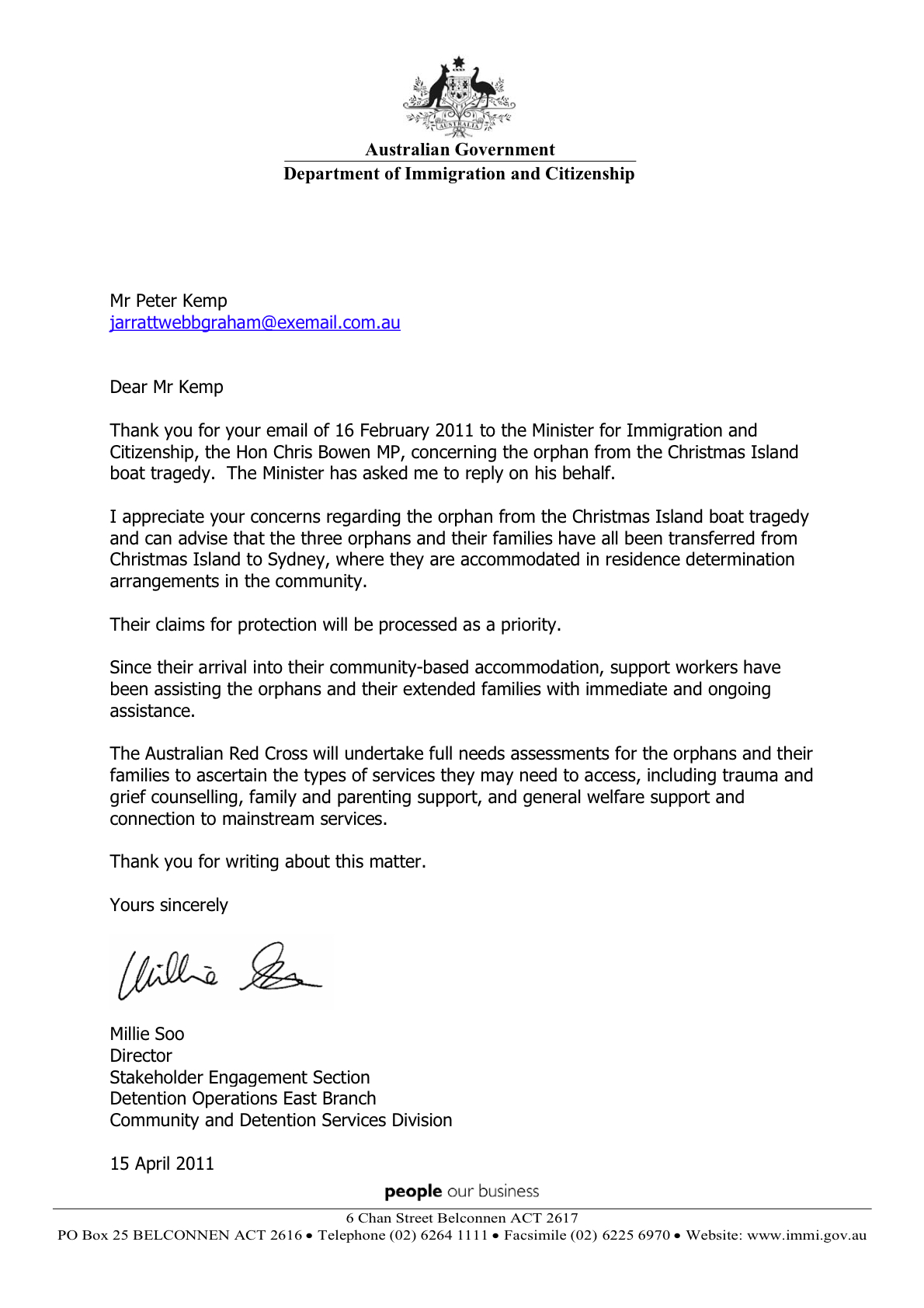
[2011-02-22 UPDATE The Catch 22 of Australian Immigration for child refugees like Seena]
The online investigative unit of ABC News Australia has obtained information of severe overcrowding at the refugee detention facility on Christmas Island. A planned capacity of 200 is now being utilised apparently now for some 522 inmates.
Almost half of the children currently held in immigration detention reached Australian shores without their parents.
In relation to those child refugees, it gets worse, as Immigration's internal decision making follows Joseph Heller's "Catch 22" logic almost to the letter:
A young applicant's prospects of being reunited with their parents is further limited by what is known as the 'time of decision rule'. This means that if a young person turns 18 prior to their own protection visa being approved, or their family members' visas being approved, their right to reunite with their parents under the split-family provision is lost.
Readers of "Catch 22" may recall that whenever those World War Two pilots got near the required number of missions to be sent home, Colonel Cathcart simply increased the number of missions required for all pilots.
The Immigration Department does not classify the parent of someone over 18 as 'a member of the immediate family' and therefore they are ineligible to apply under 'split-family' provisions.

Theme by Danetsoft and Danang Probo Sayekti inspired by Maksimer